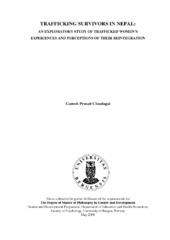| dc.contributor.author | Chaulagai, Ganesh Prasad | |
| dc.date.accessioned | 2009-09-17T12:48:35Z | |
| dc.date.available | 2009-09-17T12:48:35Z | |
| dc.date.issued | 2009-05-29 | eng |
| dc.date.submitted | 2009-05-29 | eng |
| dc.identifier.uri | https://hdl.handle.net/1956/3471 | |
| dc.description.abstract | This study set out to understand the obstacles behind reintegration process of trafficking survivors in their communities in Nepal. It is aimed at improving the status of trafficked women by making some recommendations for policy design and planning on anti-trafficking movement. This qualitative study mainly focuses on exploring the experiences of the trafficked victims in the whole process of being trafficked and perceptions on their possible reintegration. In addition, it deals with the understanding of trafficking among survivors, community people and some key organizations working on combating trafficking. The main goal of the study is finding out the gap between perceptions towards survivors' reintegration in the communities among community people and trafficking survivors. The data consisted of 18 in-depth interviews with trafficking survivors, 6 focus group discussions and some interviews with some NGOs' key persons. The data was collected in May-August, 2008 and analysed descriptively applying different theories: Stigma by Goffman, The Three Bodies Approach by Scheper-Hughes and Lock, and Empowerment Framework by Naila Kabeer. Through the narratives of trafficked women and community people, the study finds out that the stigma in the survivors created by treatment of community people is major obstacles in their reintegration. It also reveals that self stigmatization of survivors hinder the reintegration process. In addition, the study confirms that there is variation of conceptual understandings of trafficking among trafficked women and community people. Based on the major findings, the study recommends prioritizing the public awareness on trafficking and advocacy for survivors' rights. Invariably, it identifies the necessity of formulating anti-trafficking programmes and its effective implementation with the involvement of survivors for their successful reintegration. | en_US |
| dc.format.extent | 2909548 bytes | eng |
| dc.format.mimetype | application/pdf | eng |
| dc.language.iso | eng | eng |
| dc.publisher | The University of Bergen | eng |
| dc.subject | Trafficking | eng |
| dc.subject | Prostitution | eng |
| dc.subject | Trafficking survivors | eng |
| dc.subject | Trafficking victims | eng |
| dc.subject | Reintegration | eng |
| dc.subject | Perceptions | eng |
| dc.subject | Experience | eng |
| dc.subject | Gender discrimination | eng |
| dc.subject | Empowerment | eng |
| dc.subject | Self dependency | eng |
| dc.subject | Stigmatization | eng |
| dc.subject | Self stigma | eng |
| dc.subject | Shame | eng |
| dc.subject | Commodity | eng |
| dc.title | Trafficking survivors in Nepal: an exploratory study of trafficked women's experiences and perceptions of their reintergration | eng |
| dc.type | Master thesis | |
| dc.rights.holder | Copyright the author. All rights reserved | |
| dc.rights.holder | The author | eng |
| dc.description.degree | Master of Philosophy in Gender and Development | |
| dc.description.localcode | GAD350 | |
| dc.description.localcode | MAPS-GAD | |
| dc.subject.nus | 739999 | eng |
| dc.subject.nsi | VDP::Samfunnsvitenskap: 200::Sosiologi: 220 | nob |
| dc.subject.nsi | VDP::Samfunnsvitenskap: 200::Sosialt arbeid: 360 | nob |
| fs.subjectcode | GAD350 | |
